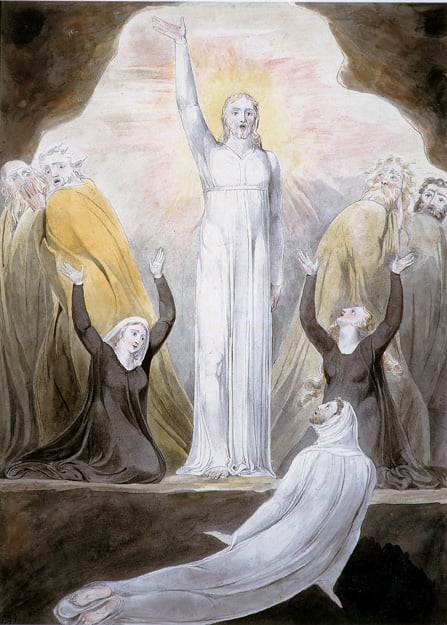Die Auferstehung.
Mei. Jesus Christus unser Heiland
der den Tod überw.
Auferstehn, ja, auferstehn wirst du,
Mein Staub, nach kurzer Ruh'.
Unsterblichs Leben
Wird, der dich schuf, dir geben.
Halleluja!
Wieder aufzublühn werd' ich gesät.
Der Herr der Ernte geht
Und sammelt Garben
Uns ein, uns ein, die starben.
Halleluja!
Tag des Danks, der Freudentränen Tag,
Du meines Gottes Tag!
Wenn ich im Grabe
Genug geschlummert habe,
Erweckst du mich.
Ach, ins Allerheiligste führt mich
Mein Mittler dann, lebt' ich
Im Heiligtume
Zu seines Namens Ruhme.
Halleluja!
Friedrich Gottlieb Klopstock
Resurrection
To Lord Jesus Christ our saviour,
who overcame death.
You are going to rise again,
My dust, after a short rest.
Immortal life is going
To be given to you by him that created you.
Halleluja!
I am planted in order to blossom again.
The Lord of the harvest goes
And collects sheaves;
We, who died, are gathered up.
Halleluja!
Day of thanks, day of the tears of joy,
You day of my God!
When in the grave
I have slept long enough,
You will wake me up.
Oh, may I then be led into the holy of holies,
By my intermediary; may I live
In sanctity
To the glory of his name!
Halleluja!
Klopstock’s ‘Resurrection song’ (first published in 1758) centres around two crucial metaphors: death as sleep (and therefore waking up as resurrection), and the dead body being buried as seed being sown (and therefore germination as resurrection). The same images reappear in texts set by Schubert:
sleep
D 496 Bei dem Grabe meines Vaters
D 869 Totengräber-Weise
seed
D 392 Pflügerlied
Other texts set by Schubert are based on even more common metaphors: night and day (dawn as resurrection) and the seasons (winter as death and spring as resurrection).
dawn
D 381 Morgenlied
D 650 Abendbilder
D 685 Morgenlied
spring
D 188, D 422 Naturgenuss
D 317 Idens Schwanenlied
D 323 Klage der Ceres
D 551 Pax vobiscum
D 731 Der Blumen Schmerz
Although these texts share a set of imagery, they do not all share the same attitude to death and resurrection. Not everyone wants to be woken up after they go to sleep. The demands of life might be too much for us.
In bräutlich heller Feier
Erscheint der Blumen Pracht,
Doch fern schon ist der Freier,
Wild glüht der Sonne Macht.
Nun künden ihre Düfte,
Dass sie voll Sehnsucht sind,
Was labend würzt die Lüfte,
Es ist der Schmerzen Kind.
Die Kelche sinken nieder,
Sie schauen erdenwärts:
"O Mutter, nimm uns wieder,
Das Leben gibt nur Schmerz."
Die welken Blätter fallen,
Mild deckt der Schnee sie zu -
Ach Gott! so geht's mit allem,
Im Grabe nur ist Ruh!
Mailáth, Der Blumen Schmerz D 731
In bright, bridal celebration
The display of flowers appears,
Yet the suitor is far away,
The power of the sun is burning savagely.
Now their scents announce
That they are full of longing.
What adds such spice to the breezes
Derives from their sorrow.
The sepals sink down,
They look towards the earth:
"Oh mother, take us back,
Life has only sorrow to offer."
The faded petals and leaves fall,
The snow gently covers them -
Oh God, that is how it goes with everything,
Only the grave offers rest.
Descendant of:
THE COURSE OF HUMAN LIFE: From the cradle to the grave RELIGIONTexts with this theme:
- Naturgenuss, D 188, D 422 (Friedrich von Matthisson)
- An die Freude, D 189 (Friedrich von Schiller)
- Huldigung, D 240 (Ludwig Theobul Kosegarten)
- Idens Schwanenlied, D 317 (Ludwig Theobul Kosegarten)
- Klage der Ceres, D 323 (Friedrich von Schiller)
- Morgenlied (Die frohe neu belebte Flur), D 381 (Johann Christoph Heise)
- Pflügerlied, D 392 (Johann Gaudenz von Salis-Seewis)
- Chor der Engel, D 440 (Johann Wolfgang von Goethe)
- Der Wanderer (Ich komme vom Gebirge her), D 489 (Georg Philipp Schmidt)
- Bei dem Grabe meines Vaters, D 496 (Matthias Claudius)
- Pax vobiscum, D 551 (Franz Adolph Friedrich von Schober)
- Sonett (Nunmehr, da Himmel, Erde schweigt), D 630 (Francesco Petrarca and Johann Diederich Gries)
- Abendbilder, D 650 (Johann Peter Silbert)
- Hymne IV (Geistliches Lied), D 662 (Friedrich Leopold von Hardenberg (Novalis))
- Trost (Hörnerklänge rufen klagend), D671 (Johann Baptist Mayrhofer)
- Morgenlied (Eh die Sonne früh aufersteht), D 685 (Friedrich Ludwig Zacharias Werner)
- Der Blumen Schmerz, D 731 (Johann (János) Nepomuk Josef Graf Mailáth)
- Totengräber-Weise, D 869 (Franz von Schlechta)
- An Laura, als sie Klopstocks Auferstehungslied sang, D 115 (Friedrich von Matthisson)


